




SINCE 1960


Consolidated Pipe & Supply—a trusted heritage spanning generations. With investments in cutting-edge technology and nationwide expansion through construction of our new state-of-the-art headquarters and distribution facilities, we stay ahead of the curve.
May/June 2024
Volume 1 • No. 30
Editorial and Advertising Offices:
201 Pryor Street, SW Atlanta, GA 30303
Phone: 404.688.0472
Fax: 678.686.6289
E-mail: gacities@gacities.com
CEO AND EXECUTIVE DIRECTOR
Larry Hanson
DIRECTOR OF COMMUNICATIONS
Latisha Gray, APR
MANAGING EDITOR
Ashley Bailey
GRAPHIC ARTIST
Lindsay Podrid
ADVERTISING SALES
Lynne Norton
EDITORIAL BOARD
Aileen Harris
Alan Dickerson
Arica Ratcliff
Brian Wallace
Chris Higdon
Chris Obenschain
Cindy Eidson
Claire Chan
Dana Goodall
Emily Davenport
Kay Love
Lisa Nguyen
Noah Roenitz
Rusi Patel
Ryan Bowersox
Sherri Bailey
GMA OFFICERS
President: Perry Mayor Randall Walker
First Vice President: Madison Mayor Fred Perriman
Second Vice President: College Park Mayor Bianca Motley Broom
Third Vice President: Young Harris Mayor Andrea Gibby
Immediate Past President: Tifton Mayor Julie Smith











The
Georgia BRIGHT
solar leasing program is on a mission to expand access to clean energy, help working families, and support local economies.
FOLLOWING THE RECENT AWARD OF A $156-million federal grant, it’s time for Georgia’s cities to get with the program. Brad Barnes and Jenn Collins cut their power usage by almost 60% in one month after the installation of solar panels on their Columbus, Ga., house.
Garden City homeowner David Morgan drastically reduced a $239 power bill by installing solar panels on
the roof of his young family’s 1,700-square-foot ranch. Thanks to a new solar energy system with battery back-up, senior citizens Marc and Margot Thomas of Savannah can rest easy knowing that their medical devices have reliable power.
These stories are just a glimpse of the powerful potential of Georgia BRIGHT (Building Renewable Investing for Green Healthy Thriving communities). This new

leasing program makes it possible for low- to moderate-income households and nonprofit organizations to afford a cost-saving solar energy system.
The cities of Atlanta, Savannah and Decatur worked with over 90 partners to launch Georgia BRIGHT in September 2023. Key partners include Rhode Island-based Capital Good Fund, a nonprofit lender with nationwide experience financing energy improvements for lower-income households; Southern Environmental Law Center, a nonprofit, nonpartisan legal advocate for clean energy and environmental justice; as well as other local governments, nonprofits, and businesses throughout Georgia.
disproportionate impact of climate change on disadvantaged communities. The program was made possible by the Inflation Reduction Act of 2022. A provision in the act allows tax-exempt entities to cash in tax credits for clean energy. Now, a community development financial institution (CDFI) like Capital Good Fund can use these “refunds” to install leased solar systems.
“Not only will this funding allow us to scale the Georgia BRIGHT Communities initiative, but we will leverage our award to support WeatheRISE ATL, our energy burden reduction program.”
Solar manufacturing is big business in Georgia. While solar energy still isn’t affordable for most homeowners, the state has one of the largest solar electric capacities in the country, according to the Solar Energy Industries Association.
These success stories could be replicated throughout the state, as local governments introduce their communities to Georgia BRIGHT.
“We really want to drive transformation in all corners of the state,” said Alicia Brown, Savannah’s interim director of sustainability, who helped bring the program to Georgia.
Driven by municipal leaders, Georgia BRIGHT was created to address rising energy costs and the
Georgia BRIGHT offers a pathway for cities to bring home the economic benefits of clean energy. In Savannah, Georgia BRIGHT helped train an energy consultant to handle local solar installations; this fulfilled the city’s need for a certified installer while creating jobs in the community.
“You gotta have all legs of the stool,” Brown said. “If you have a solar program but no one to do the work, or if you have trained solar workers but no work, you’re not doing any good.”
During this pilot year, Georgia BRIGHT aims to assist 200 households and nonprofits. Thanks to a recent

federal grant award, that number will grow exponentially over the next five years. On Earth Day (April 22), the EPA announced that Capital Good Fund was one of 60 organizations to receive a “Solar for All” grant for residential solar projects, including $156 million for Georgia BRIGHT.
“Solar for All is bringing transformative funding to Atlanta,” said Chandra Farley, Atlanta’s chief sustainability officer, in a release. “Not only will this funding allow us to scale the Georgia BRIGHT Communities initiative, but we will leverage our award to support WeatheRISE ATL, our energy burden reduction program. Together, these efforts will merge climate resilience and environmental justice by delivering healthy, energy efficient homes powered by renewable energy that saves households money.”
Capital Good Fund is negotiating a work plan and grant agreement with EPA for reallocation of the $156 million, according to Andy Posner, founder and CEO of Capital Good Fund. Posner said 78% of the federal grant will be used for solar installations and roof repairs, and 22% will be allocated for workforce development, community outreach and administrative costs.
Subgrants will be made available to local governments and other stakeholders.
Local governments can take steps now to prepare their communities for Georgia BRIGHT’s expansion.
An eligible homeowner (with a household income under $100,000) or nonprofit entity applies for a Georgia BRIGHT lease.
A solar panel system, and optional battery backup, is installed with no upfront cost and no maintenance obligation.
The family makes a monthly lease payment to Georgia BRIGHT while reaping savings on their monthly power bill. Average monthly savings are 20% off the total bill.
• Determine areas of need in the community, and don’t forget to look within your own organization. Posner said that the cities of Atlanta and Savannah notified city employees about Georgia BRIGHT.
• Assess resources that could serve in partnership with Georgia BRIGHT. For example, a nonprofit home improvement program or workforce training provider could be a viable subgrant recipient. “If we can steer dollars toward existing programs that have parameters and existing contractor networks, that would be advantageous,” Posner said.
• Co-host a listening session with Georgia BRIGHT and potential stakeholders to gauge interest. “The local governments are a conduit to reach into the community more broadly,” Posner said.
• Sign up for the Georgia BRIGHT newsletter to receive updates. Visit https://capitalgoodfund. org/bright/ and click “News.”



Sign up for the Georgia BRIGHT newsletter. Watch testimonials from Georgia BRIGHT homeowners.

Listen to the Energy One podcast with Capital Good Fund CEO Andy Posner.
https://capitalgoodfund.org/bright/
https://home.treasury.gov/news/press-releases/jy1830#:~:text=In%20connection%20with%20the%20 Production,energy%20production%20in%20energy%20communities
https://www.southernenvironment.org/news/first-of-its-kind-solar-program-brings-bill-relief-for-southern-families/
https://www.seia.org/research-resources/top-10-solar-states-0

If so, the Georgia Dig Law requires that the local government become a member of Georgia 811 as of January 1, 2024.
To become a member, contact the Customer Connections Department at customerconnections@georgia811.com or 770-623-5786.





RANDALL WALKER, GMA PRESIDENT
As I sat down to write my final editorial as GMA President, I couldn’t help but recall a scene from the popular show, Ted Lasso.
Ted, the American football coach hired to coach a soccer team in England, imparts some wisdom as he goes up against the soccer team’s former owner in a game of darts: “Be curious, not judgmental.” As it was a very popular show, many of us watched it or have see this particular scene shared on social media. It’s a simple yet profound message that resonates deeply in our personal lives and as public servants. As city officials, we must be willing to approach our roles with a spirit of curiosity.
Curiosity is the driving force behind progress and innovation. It compels us to ask questions, seek solutions, and embrace new ideas. In a constantly evolving world where the challenges we face grow more complex by the day, curiosity is our most valuable asset. On the other hand, being judgmental limits understanding, stifles innovation, impedes progress, and inhibits collaboration. Ultimately, it closes the door to those ideas and possibilities that will allow people and communities to grow and flourish.
In this magazine edition, we’re looking at sustainability, innovation, and technology and their role in shaping our cities’ future. These themes align perfectly with the spirit of curiosity, as they demand an open-minded approach to addressing complex challenges. From implementing green initiatives to harnessing the power of data analytics, we are constantly seeking new ways to build more resilient and vibrant
places to live. But innovation doesn’t happen in a vacuum. It requires collaboration, creativity, and, above all, curiosity.
As I’ve traveled the state and spoken with fellow city officials, I’ve seen firsthand the power of this type of engagement. From small towns to Georgia’s larger cities and within GMA itself, there is a real sense of curiosity among those leading the charge for change.
We must be willing to ask questions and explore unconventional solutions. We must be open to learning from each other and those we sometimes find on the other side of an issue. And we must never lose sight of the fact that every challenge we face is an opportunity for growth and improvement.
“Be curious, not judgmental.”
Let us embrace this thought, this way of living with and engaging with others, as we continue our journey toward a more sustainable and innovative future. By doing so, we can build cities that endure and thrive for generations to come.
As my tenure as President of GMA comes to a close, I am grateful for the opportunity to serve alongside dedicated and passionate leaders committed to Georgia’s cities.
Thank you for allowing me the privilege of leading your association. Let’s continue to lead our cities with curiosity, ensuing our journey toward a brighter future remains open-minded and inquisitive.
We’ve all heard the phrase, “Nothing changes if nothing changes.” This concept is particularly relevant to Georgia’s cities.

for innovation and constantly seek opportunities for growth, improvement, and progress. This is why GMA has made innovation one of our three focus areas, in addition to advocacy and service, as it relates to our philosophy and service delivery to our member cities. With the upcoming Annual Convention themed ‘Imagine the Possible,’ it’s a perfect time for cities to reflect on how embracing innovation can create a brighter future for all Georgians.
One of the most pressing areas where innovation is crucial is housing. During our spring district meetings, housing emerged as a critical issue in all 12 sessions. Our members are not only seeking ways to increase housing that aligns with the values and norms of their cities but are also grappling with the challenge of addressing substandard housing and preventing the decline of other housing stock.
Recognizing this, GMA will reconvene district meetings at our annual convention with housing as the central topic. We aim to bring in experts to discuss the complexities and potential solutions for improving housing conditions across Georgia. We plan to have cities share success stories so we can all learn together; that is one of the many benefits of our annual gathering. Imagine the possibilities if we could rehabilitate thousands of substandard homes, bringing them up to code and providing affordable housing for first-time homeowners. Envision the impact of educating residents on maintaining their homes to prevent them from becoming substandard. Sharing resources to prevent
such decline could significantly increase the housing stock and complement new construction.
One of the innovative solutions we’ll explore is the use of land bank authorities. During my tenure as city manager in Valdosta, we established one of Georgia’s first land bank authorities. Today, there are 30, but there should be 159—one for each county. Land bank authorities can forgive liens and back taxes, making properties more attractive for redevelopment and facilitating affordable housing. They can help clear titles on heir properties, providing a practical tool for transforming derelict properties into community assets.
In addition to creative solutions like land bank authorities, we will explore with cities how to proactively use code enforcement as a tool, how to utilize the court system, and, when necessary, how to replace dilapidated structures with new housing. By sharing success stories and expert insights, we hope to inspire and equip our cities to tackle the housing issue head-on, creating more opportunities for homeownership and enhancing the quality of life for Georgians.
GMA’s Annual Convention is a time for unity, learning, growth, and fellowship, and this year promises to be especially inspiring. As we imagine what’s possible for our cities, we also envision a future filled with endless opportunities and innovative solutions for Georgia—particularly in addressing our housing challenges. By coming together to share ideas and strategies, we can pave the way for more resilient, vibrant communities where every Georgian has access to safe and affordable housing.




In celebration of Georgia Cities Week, cities across the state took flight with a collective spirit of unity and pride.
FROM BUSTLING METRO CITIES TO QUAINT towns, communities came together to showcase the vibrancy of Georgia’s cities for the event’s 25th anniversary.
This year’s theme, ‘Soaring to New Heights,’ cities embraced innovation, collaboration, and civic pride. Events ranged from neighborhood clean-ups and volunteer initiatives to festive parades and cultural showcases, each highlighting their respective cities’ unique character and aspirations.
As another Georgia Cities Week came to a close, the spirit of soaring to new heights remains ingrained in the hearts of citizens, propelling them forward on a journey to collective growth and empowerment.
Here are photos from the weeklong celebration from several of our cities:


CITY OF DOUGLAS


CITY OF HAHIRA
History: Located just south of Atlanta, Hapeville is a vibrant city with a unique history and promising future. This tight-knit community offers a welcoming atmosphere and diverse attractions.
One of Hapeville’s most notable landmarks is the Hapeville Depot Museum, a testament to the city’s railroad heritage. Built in 1905, the depot now houses exhibits detailing Hapeville’s role in the development of transportation throughout the region.
Hapeville celebrates art. The Hapeville Arts Alliance, a non-profit organization that promotes local artists and cultural events, spearheads numerous initiatives throughout the year. From art walks to gallery exhibitions, this city is a haven for creative exploration.
POPULATION: 6,553
MAYOR: Alan Hallman
GMA DISTRICT:
3

For outdoor enthusiasts, Hapeville offers several parks and recreational facilities. Barrett Park, with its playgrounds and picnic areas, is a popular spot for family outings, while the Hapeville Recreation Center provides year-round opportunities for sports and fitness activities.
Hapeville’s strategic location, a stone’s throw from Hartsfield-Jackson Atlanta International Airport, makes it a haven for travelers seeking convenience and accessibility. With seamless access to major highways and public transportation, the city serves as a gateway to the vibrant Atlanta area, ensuring your journey is as smooth as possible.
Hapeville is a hidden gem. Whether you are drawn to its rich history, vibrant arts scene, or outdoor recreational opportunities, this city has something for everyone. Experience the warmth and hospitality of Hapeville – where community thrives and possibilities abound.
DUNWOODY HOGANSVILLE REIDSVILLEThe Georgia Municipal Association is imagining the possible at the GMA 2024 Annual Convention in Savannah. This year promises to offer encouraging and creative thinking along with envisioning alternative solutions for your city. Come explore what is achievable or conceivable.
Ben Nemtin is this year’s Opening Session Keynote Speaker on Sunday, June 23 at 9 a.m.
Ben Nemtin is the #1 New York Times bestselling author of What Do You Want to Do Before You Die? and The Bucket List Journal. Ben is ranked the #2 Motivational Speaker in the World by Global Gurus and starred in The Buried Life, MTV’s highest rated show on iTunes and Amazon. As the co-founder of The Buried Life movement, Ben’s message of radical possibility has been featured on The Today Show, The Oprah Winfrey Show, CNN, FOX, and NBC News. President Obama called Ben and The Buried Life “inspiration for a new generation” and Oprah declared their mission “truly inspiring.”
In university, Ben was unexpectedly hit with a depression that forced him to drop out of school. In an attempt to feel alive again, he created the world’s greatest bucket list with his three best friends. They borrowed a rickety old RV and crisscrossed North America, achieving the unthinkable. And most importantly, every time they accomplished a dream of their own, they helped a stranger accomplish their dream. From playing basketball with President Obama and having a beer with Prince Harry to reuniting a father and son after 17 years and surprising a young girl with a much needed bionic arm, Ben’s message of radical possibility has inspired millions to unlock their true potential. Ben has achieved 96 of 100 dreams and he’s set to cross off “#100: Go to Space” next year.
GMA’s Policy Committee will meet on Saturday, starting at 11:45 a.m. These committees will discuss legislative and policy issues of interest to cities. The membership will use the meetings to review and adopt the proposed 2025 policy recommendations suggested by city officials during the GMA spring district meetings and endorsed by the Legislative Policy Council. These meetings are open to everyone to attend and encourage participation.
The Municipal Marketplace provides a great opportunity for a wide range of vendors to showcase their municipal products and services available to your city. Take advantage of this face-to-face opportunity to view the latest technology, equipment and services available in 2024.
The Awards Ceremony will be held on Monday as a luncheon and will include the announcement of this year’s Municipal Government Hall of Fame inductees, the presentation of the Georgia Cities Foundation’s Renaissance and Starr awards, recognition of the Clerk of the Year and the new and recertified Cities of Ethics and Cities of Civility and the presentation of the Harold F. Holtz Municipal Training Institutes certificates. This is a ticketed event. If you did not pre-purchase a ticket for this event, you may purchase one at the registration desk before 5 p.m. on Saturday, June 22.
The 2024 Annual Business Meeting of the Georgia Municipal Association will be held on Sunday, June 23 from 3:30 pm to 5 p.m. in the Chatham Ballroom of the Savannah Convention Center and will feature Rodney Bullard, CEO, The Same House. The Same House is a community-driven movement that works to bring all people together to help bridge divides, practice compassion and collectively address communities’ greatest challenges and needs, particularly around economic opportunity and social connection. Prior to joining the organization in January 2023, Bullard served as the executive director of the Chick-fil-A Foundation. Members will also have the opportunity to adopt GMA’s 2025 Legislative Policies as well as participate in the election of GMA’s 2024-2025 Officers and Board of Directors.
The Monday morning general session will begin with a panel discussion focused on state investments in local infrastructure. The panel will include state leaders to discuss state money available to cities for transportation, housing, and water and sewer infrastructure. Updates and special recognitions from Georgia City Solutions will include a presentation from Super Bowl champion author Malcolm Mitchell. He is the creator of a youth literacy initiative called “Read with Malcolm” and is inspiring change and igniting passion among children across Georgia and throughout the country.
This year’s concurrent sessions will provide information on key issues facing Georgia’s cities. Hear from experts on building safer communities, harnessing the power of public libraries, new legislation impacting service delivery and local revenues, transforming downtowns for economic growth, addressing real estate challenges and housing affordability and citizen engagement for vibrant cities. The concurrent session will be held in 2 timeslots on Monday, from 10 a.m. to 11 a.m. and 11:15 am to 12:15 pm.
Back by popular demand, meetings will be held for districts to be equipped with knowledge and practical strategies to combat blight, address substandard housing and promote the redevelopment of affected areas using a variety of tools and mechanisms, including ordinances, code enforcement, land bank authorities and other partnerships. A panel of regional district experts will share their experiences and lessons learned in their redevelopment efforts and provide strategies and resources for cities to consider in their revitalization initiatives on Monday, from 2:45 pm to 3:45 pm. A networking reception will be held starting at 2:30 pm.
All of convention program information will be included on the new GMA mobile app available on June 3.













IS THE PHILOSOPHY

POWER OPERATES ON?
Georgia Power’s business model holds our customers in the center of everything we do. We strive for customer satisfaction by providing clean, safe, reliable, and affordable energy, with a constant focus on innovation, sustainability, and diverse representation. Our company values prioritize Safety First and Intentional Inclusion while empowering us to Act with Integrity and Commit to Superior Performance. Upholding high ethical standards guides our dedication towards economic development and the betterment of society through community engagement and environmental stewardship.
WHY DOES GEORGIA POWER SUPPORT CITIES, WHY DO YOU HAVE A VESTED INTEREST IN THE SUCCESS OF CITIES?
At Georgia Power, we support cities because they are the heart of economic growth and community development—areas where we can make a significant
impact. Our vested interest lies in the success of cities as they provide the infrastructure, talent, and markets that drive prosperity, which, in turn, fosters a robust customer base and vibrant communities for our services. By investing in the success of cities, we ensure a sustainable future for both our business and the regions we serve.
ON THE HORIZON FOR GEORGIA POWER?
On the horizon for Georgia Power is an unwavering commitment to innovation and sustainability. We’re responsibly advancing toward a cleaner energy future, while prioritizing affordability and reliability. We are enhancing grid resiliency and championing cutting-edge technologies to meet the evolving needs of our customers. Expect a continued focus on innovating customer solutions, expanding renewable energy portfolios, and investing in infrastructure to power communities reliably and efficiently, positioning us as a leader in the energy sector’s future.
DON’T MISS THE OPPORTUNITY TO TAKE YOUR leadership development to the next level by becoming a member of the inaugural class of the Georgia Mayors Leadership Academy!
Tailored for the unique role of the mayor and offered by GMA and the University of Georgia’s Carl Vinson Institute of Government through the Harold F. Holtz Municipal Training Institute, the Mayors Leadership Academy will provide an immersive learning experience designed to help mayors from cities of all sizes and geographic locations throughout the state reflect on their crucial leadership role and how to exercise influence from the chair, not just to survive but thrive. Over three days, participating mayors will engage in interactive sessions with renowned national speakers and seasoned mayors, sharing insights into cultivating relationships, responding effectively during crises, advancing community engagement, and much more.
The class size is limited and the deadline to apply is July 3, 2024.
Please visit gacities.com/mayors-academy for more information and to submit an application.
Georgia Mayors Leadership Academy
August 28-30, 2024
Georgia Center for Continuing Education
University of Georgia Athens, Georgia
The Harold F. Holtz Municipal Training Institute is operated through a partnership between GMA and the University of Georgia’s Carl Vinson Institute of Government.

Mercy Montgomery has been named as the new Assistant City Manager for Snellville. Montgomery joined the city after serving as Assistant City Manager for the City of Chamblee, where she managed the directors of Parks and Recreation, Planning and Development, and Economic Development departments, as well as a range of policy development and special projects, including housing policy, downtown activation strategies, and collaborative community service provision. Montgomery is a graduate of the University of Georgia, receiving a Bachelor of Arts in Education with a focus on experiential learning and a Master of Public Administration and a certificate in Non-Profit Management.
Georgia Peace Officers Standards and Training Council (P.O.S.T.). Wilson also serves as chair of the Public Safety Policy Committee for the Georgia Municipal Association.
The cities of Warner Robins, Columbus, and Woodstock, which are part of the Partnership for Inclusive Innovation’s Partnership Community Research Grant program, were recently honored with international smart cities awards. The cities of Warner Robins and Woodstock were both recognized with the Smart21 Community Award. The city of Columbus’s Digital Twin River Safety project was also named as a Smart 20 award winner by Smart Cities Connect.
Auburn hosted an official ribbon cutting for the city’s new Auburn Municipal Complex on April 26. The new facility will be the home to City Hall and the city’s Police Department. In attendance were former Mayor Linda Blechinger, State Senator Clint Dixon, Rep. Frank Ginn, former Rep. Terry England, and other elected officials and local leaders around the county.
Governor Brian Kemp recently swore in Forsyth Mayor Eric Wilson to serve on the
The City of Chamblee, in partnership with Ripple Glass, has launched a new program that allows residents to easily recycle their glass bottles and jars. Ripple Glass, known for its iconic purple collection bins, expanded to Atlanta in 2022 and placed a bin at the city’s Chamblee Police Department in April. Items to be accepted in the bin include glass food and beverage containers, drinking vessels, candle jars, and cosmetic bottles and jars.





More than 460 newly elected city officials successfully completed the state-mandated Newly Elected Officials Institute earlier this year. Hosted by the Harold F. Holtz Municipal Training Institute, the training sessions took place at the University of Georgia venues in Athens and Tifton.
THE INSTITUTE IS OPERATED VIA A PARTNERSHIP between GMA and the University of Georgia’s Carl Vinson Institute of Government (CVIOG).
Over three days, participants heard from subject matter experts from GMA and CVIOG, as well as city practitioners, about numerous topics, including municipal law, ethics, meeting management, financial resources, transportation and public works, taxation, planning and land use, civility, and more.
Panel discussions with veteran elected and appointed officials provided participants with insight into building collaborative relationships and meeting management.
GMA CEO and Executive Director Larry Hanson also shared words of wisdom gleaned from his years of local government experience, such as, “You don’t know what you don’t know until you know it.”
Melanie Nessmith was thinking about helping her community grow gracefully when she successfully ran for council in the Town of Register. “I am completely new to this [municipal government] process, and I’ve learned so much in the past three days,” she said. She pointed out the lessons on municipal government funding, planning, and growth as among her biggest takeaways from the event.
Jonesboro Councilmember Asjah Miller added, “I learned there are many revenue streams for my city and that GMA supports cities. I am excited to work with GMA.”
“I am completely new to this [municipal government] process, and I’ve learned so much in the past three days”
On the last day, a simulated council meeting highlighted best practices in council meetings, including rules of decorum and public hearings.
Several attendees indicated that the training was beneficial to them in their new role.
“I picked up lots of tidbits,” said Loganville Councilmember Patti Wolfe, who ran for office after being a government “watchdog” for five years. “I loved the networking!”
Winder Councilmember Power Evans said that while at the Newly Elected training, he learned that what you run on and want to do before you are elected is not always feasible.
“In reality, there is a lot you don’t realize until you get on this side,” he said. A lifelong Winder resident, Evans said he also learned a lot about the city finances and the roles and responsibilities of public works and looks forward to deepening his understanding of both subjects.”
The 2024 Newly Elected Officials training is scheduled for March 19-21, 2025, at the University Campus Conference Center in Tifton.

Chan Weeks joined the Georgia City Solutions team as Business Manager on April 1. In this role, she will manage and organize administrative and business operations supporting GCS programs and initiatives. Chan joins GCS from Keep Douglasville Beautiful, where she served as Executive Director for more than 20 years. She has extensive experience understanding how cities operate and brings that passion to GCS.

Carla Albright has joined GMA’s Conferences & Management Services team. In this role, Carla will manage conferences and events for GMA’s six local government
professional associations, including the Georgia Association of Fire Chiefs, GMA Gas Section, Georgia City-County Management Association, Georgia Downtown Association, Georgia Municipal Clerks Association, and the Georgia Association of Land Bank Authorities. She will also work with the DeKalb Municipal Association, Georgia City Solutions, and GMA’s Municipal Marketplace.
On Tuesday, April 30, 10 members of the GMA CARES Committee spent the day volunteering at HOPE Atlanta’s Women’s Community Kitchen. The CARES Committee helped to prepare meals, serve food to guests and passed out donations. As an organization, GMA was able to provide several packs of underwear, batteries, toilet paper and seven gift cards to HOPE Atlanta’s mission.
GEORGIA CITY-COUNTY MANAGEMENT ASSOCIATION HOSTS SPRING CONFERENCE
Local government leaders convened in Athens for the 2024 Georgia-City County Management Association Spring Conference, March 6-8.
The conference commenced with an inspiring keynote address delivered by Malcolm Mitchell, a
Valdosta native and renowned literacy advocate with the Share the Magic Foundation.
As part of the GCCMA Strategic Plan, the Board tasked the Awards Committee with developing a program to recognize GCCMA member communities that have implemented innovative programs, projects, or policies that address a defined problem or challenge


for their community. Winners included the following:
• City of Adel: Storybook Park
• Glynn County: Tidal Pool Floating Bridges Project


• City of Johns Creek: Driver Risk Intervention and Vehicle Education Project
• Whitfield County: Consuaga Community
Municipal Clerks from throughout the state gathered at the State Capitol on April 23 to witness Governor Brian Kemp sign the proclamation designating May 5-11, 2024, as the 55th Annual Professional Municipal Clerks Week.
Annual Professional Municipal Clerks Week was established in 1969 by the International Institute of Municipal Clerks (IIMC) and is supported by its members across the United States, Canada, and 15 other nations. The week serves as a significant occasion to honor and recognize the essential role of clerks’ offices. Throughout the week, a variety of activities took place, aiming at raising public awareness of municipal clerks and their indispensable contributions to local governance.

Board members, committee chairs, and former presidents of GCMA convened from April 28-30 in Gainesville. The city provided an ideal backdrop for
networking and participating in scheduled activities. During the retreat, attendees had the chance to examine and propose revisions to the association’s bylaws while outlining goals for GCMA’s future endeavors. GMCA is a managed association provided by GMA. Pam Helton serves as the business manager for the Clerks Association.
GMA District representatives teamed up with the Georgia Municipal Clerks Association District Directors to host several district Lunch & Learn meetings aimed at fostering networking opportunities and delving into targeted subjects. Recent gatherings held by districts 1, 2, 5, 6, 7, 9, 10, and 11 each signified an approach towards enhancing collaboration and
knowledge-sharing with local government cities. The sessions provided a platform for city clerks to exchange ideas, address common challenges, and explore innovative solutions pertinent to their communities.

SAVE THE DATE: 2024 ANNUAL GEORGIA DOWNTOWN CONFERENCE, AUG 26-29
The Georgia Downtown Association (GDA) will host the 2024 Georgia Downtown Conference in Thomasville, Georgia, August 26-29, 2024.
Each year, this conference attracts over 200 downtown professionals from across the state for the opportunity to network, learn, and grow through various session topics and tours. The conference is designed to educate attendees on issues affecting downtown development on national and statewide levels, reinforce existing development efforts and help plan for future initiatives.
For more information about the conference and to register, visit georgiadowntownassociation.org.
SAVE THE DATES: GEORGIA DOWNTOWN ASSOCIATION - CERTIFIED DOWNTOWN PROFESSIONAL CERTIFICATION
The Georgia Downtown Association will offer downtown professionals across the state the opportunity to participate in the Certified Downtown Professional Certification course throughout the remainder of 2024 and early 2025, and any Georgia downtown professionals interested in continuing their professional development should note the following dates for the certification. The Georgia Downtown Association partners with the University of Georgia’s Carl Vinson Institute of Government and Georgia Power to operate the certification.
• Atlanta: June 17 & 18, 2024
• Thomasville: August 26, 2024
• C anton: November 12 & 13, 2024
• Tybee Island: February 18 & 19, 2025
For more information, visit georgiadowntownassociation.org.
RISK MANAGEMENT AND EMPLOYEE BENEFITS SERVICES (RMEBS) KICKS OFF ROAD TOUR SERIES RMEBS has kicked off a series of events that will take its leadership team to five cities across the state in an initiative called RMEBS On the Road. The series offers a unique opportunity for members to engage with leadership while fostering valuable connections and gaining insight into programs and services. The program kicked off its first successful event in Cartersville in April and will be hitting the road and visiting with members in the following cities throughout the remainder of 2024:
• G ainesville: July 11, 2024
• Tifton: August 20, 2024
• Statesboro: November 12, 2024
For more information, please visit https://youtub.be/zl8VRPaaBxM?si=wAeM2zcw6YTt5WN3

Bricks & Mortar Program: Real estate projects including City Halls, Police/Fire Stations and Public Parks, Theaters and Greenspaces
Direct Lease Program: Eligible essential equipment including police and fire vehicles, heavy equipment, computer servers and other asset classes.
Program benefits include:
• Flexible finance terms
• Attractive interest rates and competitive terms
• No upfront fees or prepayment penalties*
• Real estate project compliance with Section 36-60-13 of the Official Code of Georgia Annotated
Contact: Philip Potter ppotter@gacities.com to learn more *terms determined during RFP process, other restrictions may apply


 Newnan Fire Training Facility
Milton Public Safety Complex
Newnan Fire Training Facility
Milton Public Safety Complex
This year, the Municipal Leader Diversity, Equity, and Inclusion Certificate Program proudly celebrates its second graduating class, a diverse group of 24 city elected officials and city staff committed to advancing equity and inclusiveness in their communities.
THE PROGRAM, PART OF GEORGIA CITY Solutions EMBRACE initiative, is designed to equip leaders with the knowledge and tools necessary to build sustainable, equitable economic prosperity in their cities. Throughout the course, participants engaged in eight detailed modules covering a range of critical topics, from inclusive leadership and emotionally effective leadership to financial management, public safety and more.
The modules were strategically chosen to touch on all aspects of municipal governance. For instance, the Economic and Community Growth module provided insights into fostering environments that spur economic activity while ensuring benefits are widely shared among all community members. Similarly, the Community Engagement module emphasized the importance of involving community members in decision-making processes, reinforcing the foundation of trust and mutual respect.
A significant part of the program involved handson learning through a capstone project, where each participant developed and proposed practical solutions tailored to their own communities. These projects aimed to address and remove social barriers, ensuring a more inclusive environment where everyone can belong and thrive.
As this year’s cohort moves forward, they take with them not only a deeper understanding of DEI principles but also practical strategies to implement change. Their completion of the program marks an important step forward in their ongoing journey to enhance the quality of life within their communities.
This initiative continues to show promising results, with graduates ready to apply what they’ve learned and lead their cities toward a future where valuing differences, encouraging equity, and promoting inclusivity are at the forefront of governance. Congratulations to all the graduates on their achievements, and best wishes as they continue this important work in their organizations and communities.
Aileen Harris Georgia Municipal Association Develop A More Inclusive Training Program
Chief Albert S. WrightCity of Riverdale Riverdale Fire Service Diversity, Equity, and Inclusion Plan
Azsha M. HankersonCity of Savannah Fostering Diversity and Inclusion Through Employee Resource Groups
Bill Tanks City of Mableton Diversity, Equity, and Inclusion Program for the City of Powder Springs*
Mayor Brian K. MockCity of Chamblee Is DEI Here to Stay?: Addressing Current Successes and Future Challenges
Candace Pullum City of St. Marys Inclusive Communication Plan for our Diverse Community*
Charlene Marsh City of Norcross Inclusive Leadership: An Emerging Leaders Program
Chief Colin CampbellCity of Madison Equitable Wheelchair Accessibility*
Diane Lewis City of Forest ParkExploring Cultural Differences in our Community
Donna Larsen City of St. Marys Inclusive Communication Plan for our Diverse Community*
Councilmember Hector GutierrezCity of Forest ParkExploring Cultural Differences
Henry Smith City of Powder SpringsDiversity, Equity, and Inclusion Program for the City of Powder Springs*
Councilmember Jacqulene Bridges City of Carrollton Diversity Equity and Inclusion Workforce Development Program
James Albright City of Acworth Human Connections: Building Relationships through Assessments
Councilmember Jessica WilbanksCity of Palmetto Palmetto Cultural Arts Committee*
Karen Robertson City of Madison Equitable Wheelchair Accessibility*
Mayor Pro Tem Melissa R. Bayardelle City of Hiram Dr. King Service Day & Seniors Matter Event
Michelle Hunter City of Suwanee
Creating a Diversity, Equity, and Inclusion Strategy as a Part of the Human Resources Strategy
Councilmember Rashida TaylorCity of Metter Building a Sustainable Juneteenth Program
Remy Epps
Athens-Clarke CountyConducting a DEI Maturity Survey
Rosalyn Y. Nealy City of Powder SpringsDiversity, Equity, and Inclusion Program for the City of Powder Springs*
Shavala Ames
Formerly City of College ParkMental Health: Diversity, Equity, Inclusion, and Belonging in Government
Mayor Teresa Thomas-SmithCity of Palmetto Palmetto Cultural Arts Committee*
Xavier "Xe" Ross City of Stonecrest Develop a DEI Vendor Policy to Promote Equality
* Denotes Group Project


Most people know that solar energy is poised to be a critical differencemaker in the fight against climate change. It also has the potential to make tangible improvements that everyday people will notice, such as better air quality, reduced water usage and lower energy bills.
As global efforts to expand solar energy offerings ramp up, however, so does the demand for certified practitioners to design and install such technology. Now, thanks to a recent and immensely successful partnership between the City of Milledgeville and Georgia College and State University (GCSU), more people are qualified to work in the solar technology space as employees or even business owners. This is all happening via a newly launched certificate program that teaches both critical business principles and solar power systems technology.
The entire initiative was made possible by funding from a group called the Partnership for Inclusive Innovation (PIN). This organization endeavors to drive innovation in Georgia through sustainable initiatives that encourage economic prosperity, explains Hank Griffeth, Milledgeville’s City Manager. The city enthusiastically agreed to come on board as the required municipal partner for the project, at the request of GCSU’s Center for Innovation and Entrepreneurship, led by the center’s director Dr. Nicholas Creel. The proposal ticked off all of the grant requirements, but at its core, “The program’s eco-entrepreneurship element teaches the people in these classes to start their business and take leading management roles in green technology business,” Dr. Creel explains.
look at the good that solar panels do by lowering bills and not putting anything toxic in the community, it’s obviously a great idea to move forward.”
The program couldn’t be a sweeter deal for people looking to get into this increasingly in-demand space. Not only is it cost-free (roughly a $1,500 value), but the four cohorts that have already run offered varying flexible schedules, including weekday or Saturday-only options. This is ideal for working adults, some of whom traveled up to two hours each way for the experience.
“When you look at the good that solar panels do by lowering bills and not putting anything toxic in the community, it’s obviously a great idea to move forward.”
Additionally, few other in-person opportunities are available locally to obtain the training needed for a North American Board of Certified Energy Practitioners (NABCEP) certification. “These programs do exist but the majority are online,” Dr. Creel. While online options are certainly viable, he says, “It’s better when you can see and do and practice in person with one-on-one instructor time.”
The program is set to benefit both students and the city at large. “I see it having a great impact on our city,” says Mayor Mary Parham-Copelan. “When you
For the pilot program, Dr. Creel and his team opted to keep small class sizes of ten students per cohort. This allowed students to “Learn what they’re doing in a hands-on education experience,” he explains. “Demand far exceeded the supply,” he says, noting that at least 200 would-be students were waitlisted during the first incarnation.
Motivations for taking the course varied depending on the student, but most are looking to upscale to a higher-paying, in-demand career path, Dr. Creel says. Ideally, this will result in an economic boon for the area. “We’d love to see it create a new industry that people can go into within the city,” Griffeth says. That said, “Some students are just looking to electrify their own houses,” Dr. Creel explains. “They want to buy the parts and do it themselves.” More power to them, right?
The City of Milledgeville, for its part, will provide the location for the student’s capstone project. A solar energy installation will likely be placed at the city’s water treatment plant. “It could ultimately decrease the energy cost for our water treatment plant, and may even serve as a tertiary energy source for the plant should the primary or secondary source go down for whatever reason,” Griffeth explains. Should all go well with that installation, the city is open to expanding and
funding additional green energy improvements down the road, which could involve program graduates.
The overwhelming success of the first set of cohorts has both GCSU and the city enthusiastic about continuing the program. Per Dr. Creel, “We’d like to secure funding to continue this for the long-term and even expand the slate of offerings. “We’d like to offer higher levels of certification in solar technology and maybe even look into other elements of green tech,” he explains.
Mayor Parham-Copelan sees it going even further. “I think this is a great pilot program launching from a prominent school,” she says, adding that she believes it has potential to catch on and expand to other cities. “This has been a win/win for Milledgeville and I’m glad we were able to be the pilot city.”

Established in 1949, Manley Spangler Smith Architects was rooted in a legacy of exceptional design and unwavering commitment to client service. Today, MSSA-PBK is an award-winning industry leader in architecture, engineering, interiors, planning, technology, and facility consulting with client service at the forefront of everything we do.



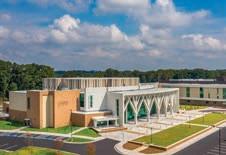
525 East Taylor Street


Griffin, Georgia 30223
P: 770.227.5473
SUGAR HILL
5019 West Broad Street
Sugar Hill, Georgia 30518
P: 770.227.5473

 GRIFFIN
GRIFFIN
On April 10, the US Environmental Protection Agency (EPA) issued a new National Primary Drinking Water Regulation that focuses on limiting exposure to harmful per- and polyfluoroalkyl substances (PFAS), which are known to increase the likelihood of cancers, liver disease, heart attacks, and strokes in people when exposed to high levels. PFAS have been found in waterways nationwide as a result of them being used to make carpets, clothing, paper packaging for food, and fabrics for furniture. They are also found in firefighting foams used by the Air Force at bases across the country. Often referred to as “forever chemicals,” these pollutants do not diffuse or break down once they reach waterways and tend to remain in the water in high concentrations for long periods of time.
EPA announced almost $1 billion in newly available funding through the Bipartisan Infrastructure Law that will go toward implementing PFAS testing and treatment at public water systems, along with helping owners of private wells address instances of PFAS contamination. This is part of a $9 billion investment through the Bipartisan Infrastructure Law that aims to assist communities with drinking water impacted by PFAS and other contaminants.

EPA is setting Maximum Contaminant Levels (MCLs) at 4.0 parts per trillion for certain pervasive substances (PFOS and PFOA), and at 10.0 parts per trillion for others (PFNA, PFHxS, and HFPO-DA). These regulations will require investments in technologies that can treat drinking water supplies to reduce the level of exposure to PFAS. The final rule will reduce PFAS exposure for approximately 100 million people, which is expected to prevent thousands of deaths and tens of thousands of serious illnesses.
Georgia cities are directly impacted by this regulation because many have water systems that exceed EPA’s newly established limit for these pollutants. EPA released a schedule for compliance with the new pollutant limits that includes deadlines which water systems and cities nationwide must meet.
Water systems need to complete the initial monitoring within 3 years (by 2027). Local governments and water utilities are then required to inform the public of the level of PFAS found in their drinking water. By 2029, water systems are expected to implement solutions to reduce PFAS in their drinking water to comply with all MCLs.
Testing is already underway in Georgia as part of the EPA requirements, and high levels of contaminants have been found in several cities. PFAS chemicals were not detected in Atlanta’s drinking water during testing done between 2021 and 2023 as part of a state monitoring program, but the recent monitoring required by the EPA indicated the presence of several unregulated contaminants in the drinking water, including PFAS. The testing that has been reported in Georgia thus far indicates that at least a dozen water systems across the state likely need upgrades to adhere to the new standards. This number is likely to increase, as the EPA estimates that 4,000-7,000 public drinking water systems nationwide will have to take measures to reduce PFAS to meet these new standards.
Many cities that have been negatively impacted by PFAS are already taking action. There are a number of nationwide class action lawsuits against corporations including 3M, Dupont, BASF and TYCO, some of which have already yielded billions of dollars in settlements, which will be pooled and made available to cities and water system operators impacted by PFAS pollution.

Rome filed lawsuits against multiple PFAS manufacturers and so far has been awarded almost $300 million through settlements with numerous manufacturers who operated in the city’s watershed. The city has plans in place to address the contamination in its water by building advanced water treatment facilities.
Clayton estimates approximately $450 million in needed upgrades to its facilities, with half being devoted to PFAS removal. The city plans to mitigate costs by receiving grants and loans, and by opting into class action settlements.
EPA has multiple resources on its website, including fact sheets, a set of frequently asked questions, a toolkit on how to inform and communicate with the public, and a guide on which filters most effectively reduce PFAS in drinking water.
Georgia’s Environmental Protection Division (EPD) compiled an array of useful information here that explains PFAS, outlines drinking water regulations, and reports survey findings from drinking water monitoring.
Like. Subscribe. Heart emoji. Comment. Share. The world is a much different place than it was a few decades ago. The first social media website was launched less than thirty years ago and the first mainstream popular social media websites were launched just over two decades ago.
MANY OF THOSE EARLY SOCIAL MEDIA WEBSITES no longer exist, though others like Facebook, Reddit, YouTube, and X (the artist formerly known as Twitter) have grown into billion-dollar corporations, with extensive community and world-wide reach.
In many ways these social media platforms are far more effective as a communication tool to the masses than any traditional media platform, such as radio, television, or newspaper.
However, one hard truth with the law is that it is always behind the times when it comes to technology. One other hard truth is that people often do dumb things when it comes to technology. Both of these truths are very clearly illustrated in the usage of social media platforms by some public officials, both elected and appointed.
Can government officials block people or delete comments from social media sites? What if it is a personal social media page used to post government information? Is the social media site maintained by the government itself?


Much of the case law surrounding these and other similar questions has been scattered for a long time but recently the United States Supreme Court weighed in on some of these issues and provided guidance to appointed and elected officials across the country.
In O’Connor-Ratcliff v. Garnier, two candidates for public office created public Facebook pages to promote their campaigns and, after they won election, they utilized such pages to post government-related content and to solicit feedback and communicate with constituents.
Unfortunately, like many elected officials learn, they also drew critics to their pages including a couple of critics who would post repeated comments and replies to dozens of posts. The elected officials initially deleted the comments but eventually resorted to blocking the critics from posting comments outright.
Unsurprisingly, the critics filed suit seeking damages and relief for alleged violations of their First Amendment rights. Eventually, the case wound its way all the way up to the United States Supreme Court where the

























Court remanded the case back to the Court of Appeals so that the appellate court would follow the Court’s approach in the more significant case, Lindke v. Freed.
The Lindke decision provides local appointed and elected officials real guidance on social media usage and regulation under the First Amendment. It is a decision that local officials should all take the time to understand.
In Lindke, a man, Freed, created a private Facebook profile which he eventually converted to a public page, meaning anyone could see and comment on his posts. Sometime later, Freed became the appointed city manager of a mid-sized city in Michigan. His Facebook page reflected his new position as well as his family status.
After becoming city manager, Freed continued to operate the Facebook page himself and mostly post about his personal life. However, Freed also occasionally posted information related to his job, “such as highlighting communications from other city officials and soliciting feedback from the public on issues of concern.”
commenting on the official’s social-media page engages in state action … only if the official both (1) possessed actual authority to speak on the State’s behalf on a particular matter, and (2) purported to exercise that authority when speaking in the relevant social-media posts.”
Significantly, the Court held that the “distinction between private conduct and state action turns on substance, not labels: Private parties can act with the authority of the State, and state officials have private lives and their own constitutional rights—including the First Amendment right to speak about their jobs and exercise editorial control over speech and speakers on their personal platforms.”
“However, one hard truth with the law is that it is always behind the times when it comes to technology. One other hard truth is that people often do dumb things when it comes to technology. Both of these truths are very clearly illustrated in the usage of social media platforms by some public officials, both elected and appointed.”
Freed would often respond to comments on his posts but would also occasionally delete comments. Following the start of the COVID-19 pandemic, Freed would post information related to the city’s approach to the pandemic, which drew comments from Lindke “expressing his displeasure with the city’s approach.”
The Court noted that Freed had a “mixed use” social media page “where he made some posts in his personal capacity and others in his capacity as city manager.” The Court held that someone filing suit has to show that the official was exercising state authority in specific posts to succeed on their First Amendment claims. Additionally, the Court determined that the nature of the technology mattered as deleting comments was only relevant to the posts from which the comments were deleted but blocking operated as a page-wide ban.
At first, Freed would delete Lindke’s comments but he eventually resorted to blocking Lindke altogether from his Facebook page. Again, unsurprisingly, Lindke sued alleging that his First Amendment rights had been violated. Both the District Court and the Court of Appeals held in favor of Freed, determining that the Facebook page was managed by Freed in his private capacity.
In conclusion, the Court’s final takeaway is one all local officials should take to heart: “A public official who fails to keep personal posts in a clearly designated personal account therefore exposes himself to greater potential liability.”

The United States Supreme Court, however, held that a “public official who prevents someone from


1 GMA has, for years, trained in regard to social media usage that “if an employee is making statements related to their official duties then they are not speaking as a private citizen and their statements are not protected.” This training is very similar to the holding of the United States Supreme Court.


In April, Young Gamechangers from across the state kicked off its program in Valdosta, Georgia.
EACH YEAR, GEORGIAFORWARD BRINGS TOGETHER A diverse and aspiring group of leaders from within a host community, and from throughout the state to immerse themselves in the challenges of a single community. The 45 young professionals then spend time developing specific, creative, and actionable recommendations.
The work of the group centers around challenge questions that are designed to address the community’s most pressing needs.
The challenge questions asked by Valdosta-Lowndes County are:
GREEN INFRASTRUCTURE: How can Valdosta-Lowndes create and maintain sustainable parks, trails, and green spaces for all in our community?
ECONOMIC DEVELOPMENT: Valdosta is increasingly attracting new industries to the area. With the anticipated industrial recruitment success, how do we retain talent and build capacity for the needed workforce as well as support existing businesses in growth climate?
CORRIDOR REDEVELOPMENT: How can the city improve its ability to support neighborhood-based, mixed-use redevelopment in the Barack Obama, Patterson overpass, Ashley Street, and Griffin Avenue corridors?
How do we strengthen community togetherness among the various demographic groups within Valdosta-Lowndes County and help those suffering from lack of resources and social connection?
The Young Gamechangers will share their final report with the local community on October 10.
Valdosta Mayor Scott James Matheson said he is proud to welcome the Young Gamechangers to the Valdosta-Lowndes area. “This initiative not only underscores our dedication to inclusive growth and expansion but also showcases the immense talent and potential of Georgia’s young leaders,” he said.
The Young Gamechangers are accomplished professionals ages 40 and under from across the state who wish to make an impact through civic engagement, economic development and community partnerships. A third of the class is from the Valdosta-Lowndes county area, another third is from the metro Atlanta region and the remaining third are from greater Georgia.
IF YOU ARE INTERESTED IN APPLYING TO BE A FUTURE YOUNG GAMECHANGER OR SERVE AS A HOST CITY FOR THE PROGRAM, PLEASE CONTACT SADIE KRAWCZYK AT SKRAWCZYK@GACITIES.COM OR VISIT GAFORWARD.ORG FOR MORE INFORMATION.

6/1 – 6/29
Ida Cox Music Festival Toccoa
6/2
Music in the BranchJonathan Ingram Band Flowery Branch
Concerts by the Springs-Savannah Jack Sandy Springs
6/6
Family to Park Day
Powder Springs
Beats on the Streets Lawrenceville
Food That Rocks
Sandy Springs
6/7
Under the Sea Winder
Open Streets Perry Perry
Fridays-N-Duluth DFAL Art Walk
Duluth
6/8
Downtown GetDown Concert Series
Eatonton
Conyers Concert Series
Michael Jackson Ultimate Expérience Conyers
Jasper Downtown Live! Jasper
Conyers Concert Series Who’s Bad Conyers

6/9
Duluth Farmers & Artisan Market
Duluth
6/13
Beats on the Streets
Lawrenceville
Braselton West Wine Hope Braselton
6/14
Block Party with Margaritaville Flowery Branch
Summer Porch Jam Suwanee
Fridays-N-Duluth: Pride Duluth
LIVE in the DTL Lawrenceville
6/14-7/5
DTL Happening: Flag Day Celebration Lawrenceville
6/14-6/16
NAACP Cobb County
Juneteenth Marietta
6/14-8/9
Main Street Movies
Dahlonega
6/15
Cruzin’ Down Doyle Toccoa
Juneteenth Freedom Festival Perry
Rotary Car Show
Duluth

6/19
Juneteenth Celebration Sandy Springs
6/20
Family to Park Day Powder Springs
Beats on the Streets Lawrenceville
6/21
Logtown Concert Series Adairsville
Lawrenceville Movie Club: Daddy Day Care Lawrenceville
Bubble Bash Winder
Fridays-N-Duluth Duluth
6/21-6/23
Art-Tiques Summer Market Braselton
6/22
Juneteenth Celebration Powder Springs
6/23
Duluth Farmers & Artisan Market
Duluth
6/27
Beats on the Streets Lawrenceville
6/28
Summer in the City Music & Fireworks Commerce


6/28-9/21
Fall Fest Bands, Brews & BBQ Car Show
Commerce
6/29
Adairsville Celebrates America Adairsville
Independence Day Celebration Auburn Red White & Boom
4th of July Celebration Hiram
7/3
Prelude to the Fourth Lawrenceville
Red White & Boom Conyers
7/4
July 4th Celebration Powder Springs
Marietta’s Fourth in the Park Marietta
Independence in the Park Covington
Stars & Stripes Sandy Springs
Independence Day Celebration Perry
Dahlonega 4th of July Celebration Dahlonega
Celebrate Braselton July 4th Parade, Festival & Fireworks Braselton
7/5
Celebrate Winder Winder

Fridays-N-Duluth
Duluth
7/7
Music in the Branch-Mary Kate Farmer Flowery Branch
7/11
Family to Park Day Powder Springs
Beats on the Streets
Lawrenceville
7/12
Fridays-N-Duluth: Eureka! Duluth
7/13
Downtown GetDown Concert Series Eatonton
Jasper Downtown Live! Jasper
7/14
Concerts by the Springs: G Clef and the Playlist Sandy Springs
Duluth Farmers & Artisan Market Duluth
7/18
Farmers Market: Tomato Sandwich Party Flowery Branch
Beats on the Streets
Lawrenceville
7/19
Logtown Concert Series Adairsville
Back to School Bash Hoschton
Fridays-N-Duluth
Duluth
7/20
Christmas in July Market on the Square Covington
7/25
Family to Park Day Powder Springs
Memorial Day Powder Springs
Beats on the Streeets Lawrenceville
7/26-7/27
Firefly Festival Madison
7/27
Sounds of the Springs Concert Series Powder Springs
Viva Las Duluth Duluth
7/28
Duluth Farmers Market Duluth
To place a free Fairs & Festival listing contact gacities@gacities.com. Please submit listings at least eight to ten weeks ahead of publication date.
IN HONOR OF NATIONAL HISTORIC PRESERVATION MONTH, TAKE A MOMENT TO EXPLORE PERRY’S NEWLY RENOVATED CITY HALL
LOCATED ON THE PUBLIC SQUARE, THE FORMER Houston County courthouse, has been a focal point since Perry’s founding in 1824.
The current building, dedicated in 1950, is known for its unique features, such as Georgia marble, granite, and locally crafted brick.
In 2020, the City of Perry purchased the building from the Houston County government to address the need for expanding services and to revitalize a historic building in Historic Downtown Perry.

Extensive renovations to the building were completed in 2023 and transformed the historic courthouse into Perry’s municipal court, council chambers, economic development and city clerk offices, and the Perry Welcome Center.
Visitors can learn more about the building’s history by scanning the QR code on the Historic Sites Self-Guided Tour sign or by visiting perrygatours.com.


